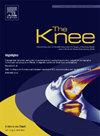Revision of unicompartmental knee replacement can achieve equivalent outcomes to primary total knee replacement when revised for confirmed pathology
IF 2
4区 医学
Q3 ORTHOPEDICS
引用次数: 0
Abstract
Introduction
There is conflicting evidence regarding outcomes following revision of Unicompartmental Knee Replacement (UKR) to Total Knee Replacement (TKR). We hypothesise that a UKR can be successfully revised to a TKR with equivalent outcomes to primary TKR when revised for a well-defined revision diagnosis such as progression of arthritis.
Methods
From 2011 to 2023, the records of a surgeon were reviewed to identify patients who underwent revision of a UKR. Data collected included indications for revision, implant details, oxford knee scores (OKS) and survivorship. The OKS of the revision group was compared with a group of primary TKRs.
Results
A total of 21 revision UKR to TKR were included in the study. Primary Cruciate Retaining implants were used in all but 1 revision (Posterior Stabilised) with tibial sided augments or a stem required in 4. Survivorship of the revision UKRs was 95.2% at a mean of 4.37 years post-operatively. Mean OKS for the group was 37.65 with an improvement of 19.65 (p = 0.0001). Patients revised for a well-defined indication had 6-month mean OKS of 41.29, comparable to the primary TKR mean OKS of 39.5 (p = 0.535). Patients revised without confirmed pathology had mean 6-month OKS of 29.17 which was significantly worse than the remaining revision UKRs and primary TKRs (p = 0.001).
Conclusion
When a UKR is revised for a well-defined revision indication, patients can expect equivalent outcomes to primary TKR. This study also confirms that in most instances, a UKR can be successfully revised utilising primary implants with good midterm survivorship.
经病理证实,单室膝关节置换术的翻修可获得与原发性全膝关节置换术相当的结果
关于单室膝关节置换术(UKR)修改为全膝关节置换术(TKR)后的结果,有相互矛盾的证据。我们假设,当针对明确的诊断(如关节炎进展)进行修订时,UKR可以成功修订为TKR,其结果与原发性TKR相当。方法回顾2011年至2023年一位外科医生的记录,以确定接受UKR翻修的患者。收集的数据包括翻修指征、植入物细节、牛津膝关节评分(OKS)和生存率。复习组与原发性TKRs组的OKS进行比较。结果共纳入21例UKR对TKR的修正。除1例翻修(后稳定)外,其余翻修均使用初级十字固定种植体,4例需要胫骨侧增强物或支架。术后平均4.37年,修订后UKRs的生存率为95.2%。该组平均OKS为37.65,改善19.65 (p = 0.0001)。根据明确适应症修订的患者6个月平均OKS为41.29,与原发性TKR平均OKS为39.5相当(p = 0.535)。未确认病理的修改患者的平均6个月OKS为29.17,明显差于其余修改后的ukr和原发性tkr (p = 0.001)。结论:当UKR根据明确的适应症进行修订时,患者可以期待与原发性TKR相同的结果。该研究还证实,在大多数情况下,UKR可以使用初级植入物成功修复,中期生存率良好。
本文章由计算机程序翻译,如有差异,请以英文原文为准。
求助全文
约1分钟内获得全文
求助全文
来源期刊

Knee
医学-外科
CiteScore
3.80
自引率
5.30%
发文量
171
审稿时长
6 months
期刊介绍:
The Knee is an international journal publishing studies on the clinical treatment and fundamental biomechanical characteristics of this joint. The aim of the journal is to provide a vehicle relevant to surgeons, biomedical engineers, imaging specialists, materials scientists, rehabilitation personnel and all those with an interest in the knee.
The topics covered include, but are not limited to:
• Anatomy, physiology, morphology and biochemistry;
• Biomechanical studies;
• Advances in the development of prosthetic, orthotic and augmentation devices;
• Imaging and diagnostic techniques;
• Pathology;
• Trauma;
• Surgery;
• Rehabilitation.
 求助内容:
求助内容: 应助结果提醒方式:
应助结果提醒方式:


